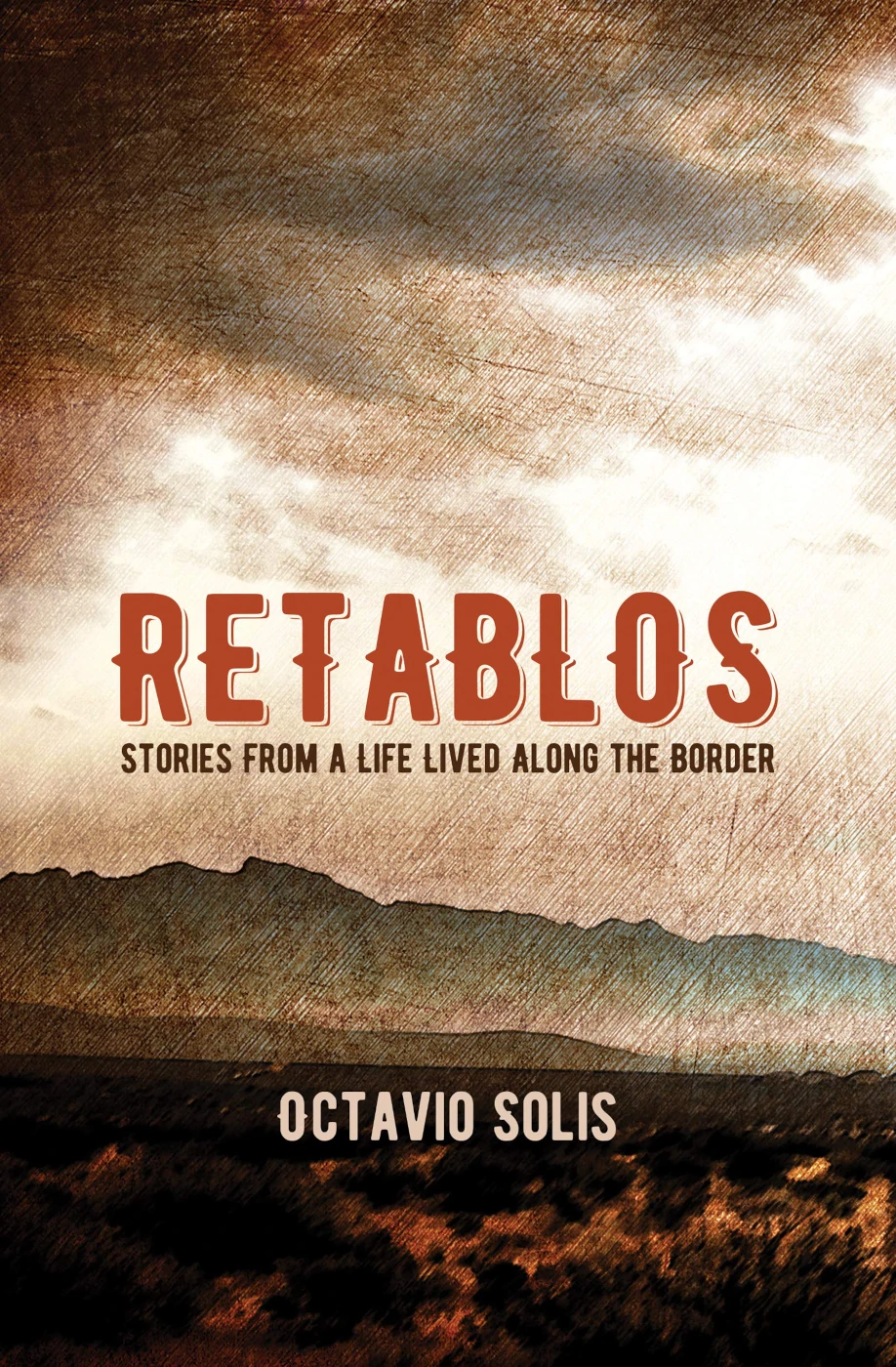
Octavio Solis’ Retablos: Stories from a Life Lived Along the Border
Words By Thomas Chisholm
“If this is a memoir, it’s a faulty one.” In the introduction to Retablos: Stories from a Life Lived Along the Border, Octavio Solis illuminates the unreliability of memory. He notes that the act of remembering trims away inconsequential details, which endow what’s remembered with greater clarity, weight, and significance.
The marriage of memory and fiction is successful throughout the book. When an abandoned truck full of narcotics is found in the middle of the Rio Grande, a literal tug of war breaks out between Mexican citizens and the US Border Patrol. It’s cartoonish and difficult to accept. Yet after such a magical and cinematic scene of defeat it no longer matters how much is embellished. It’s just so much a microcosm of US/Mexico border relations, with each side pulling the other towards itself. When you’re so busy laughing or smacking your forehead in disbelief, it’s hard to care whether it’s true or not.
At sixty, Octavio Solis’s memories from youth began feeling more like dreams. He chose to write them down in an act of reclaiming them as authentic. But as he wrote, even his most accurate memories began to take on a strange unreality similar to his dreamlike past. Solis ultimately gave himself creative license to embellish. His goal in writing Retablos was to depict the events of his life “as a means to identify and limn the mythology of being brown along the US/Mexico border during a specific time.” He wanted to share those resonances with people his age, and with people coming of age along the border today. That intended audience is evident from his prose. Throughout the book, his text oscillates back and forth between English and Spanish, with the vast majority written in English. Yet when he incorporates Spanish it’s often slang, and sometimes slang that’s specific to a family or tight-knit community.
Solis came of age in El Paso, TX, located in the remote easternmost tip of Texas, in the Chihuahuan Desert. As he wrote, he began to suspect that this place was what was truly surreal about his work. Solis suggests that the city is even more peculiar than its geography. He considers it divine, “though not the divine we are taught to believe in.” Across the Rio Grande is Ciudad Juárez, the largest city in the Mexican state of Chihuahua. Before the establishment of the present United States/Mexico border, El Paso and Juárez coexisted as neighboring communities. That relationship still existed in the period Retablos captures, the late 1960’s and 70’s, when citizens of each nation flowed through the sister cities with ease. Many inhabitants of Juárez worked in El Paso during the day and crossed the Ysleta International Bridge back each night.
Solis is shaped by the dizzying experiences that make up Retablos, that come from a life lived in between. The collection is full of contradictions: Though born in the United States, as a small boy Octavio is harassed by Border Patrol agents who profile him as someone who’s crossed the border illegally. The Border Patrol agent that profiles the young Octavio is Hispanic himself, and quizzes the boy on his Spanish. The agent assumes that if Octavio knows Spanish, a language that the agent is also fluent in, Octavio is not a US citizen. Later, Octavio crosses into Juárez with his friends for a night of partying and is refused service by a bartender who tells the boys they’re nothing but gringos to him.
Through these retablos, the reader learns how painful growing up can be, and how one learns from mistakes and can be transformed by them. Retablos is ultimately a coming of age story—but one pockmarked with incidents of pain that only a city on the border could create. These moments of pain are when the real world seeps into childhood and rough truths are bestowed. As an adolescent playing hide and seek in the tall grass, Octavio meets a girl a few years older than himself hiding out in a culvert. Her clothes are ragged and dirty; she’s just barely made it across the border. Octavio fears how easily his life could have been hers. A few years later, the Immigration and Naturalization Service raid the greasy spoon Octavio and his father work at. His friend and an older kitchen-staffer both get deported.
Though he is a celebrated playwright, this is Solis’s first book. His prose is subtle yet bursting with metaphors and masterful turns of phrases. In a truly traumatic scene, a young Octavio flees his home with his mother and siblings as his father shoots at them from behind. Solis points out all of the bullet holes are in the floorboards, that his disgruntled old man meant to miss, like he was only killing off their shadows. After the police leave without making an arrest, the shaken Solis writes, “I’m still standing by the station wagon, wondering what happened to my shadow.” It’s a shocking anecdote that Solis frames as the only instance of physical abuse by either of his parents. Solis sees this one act as a reckless display of frustration. He doesn’t try to excuse or condone his father’s actions, but illustrates the omnipresence of violence in border communities as a result of the classism and racism their people must endure.
From the high ground of hindsight, Solis avoids the pitfalls of confessionalism. He’s able to relive trauma, embarrassment, joy, and misery without the melodrama of a diary. He’s able to contextualize his past and show readers how it made him the man he is, all the while illuminating how absurd life on the border has always been, despite what may be the most cartoonish present we’re stuck in.